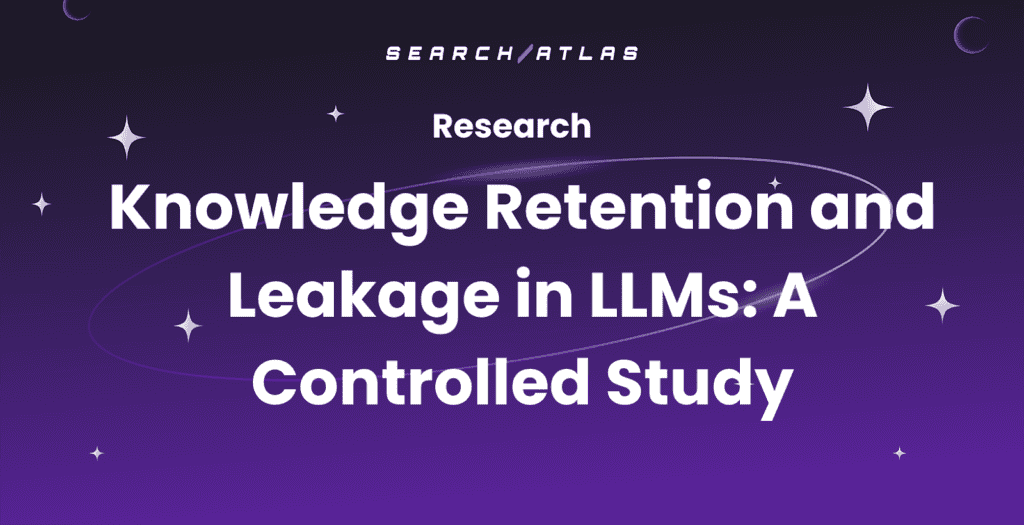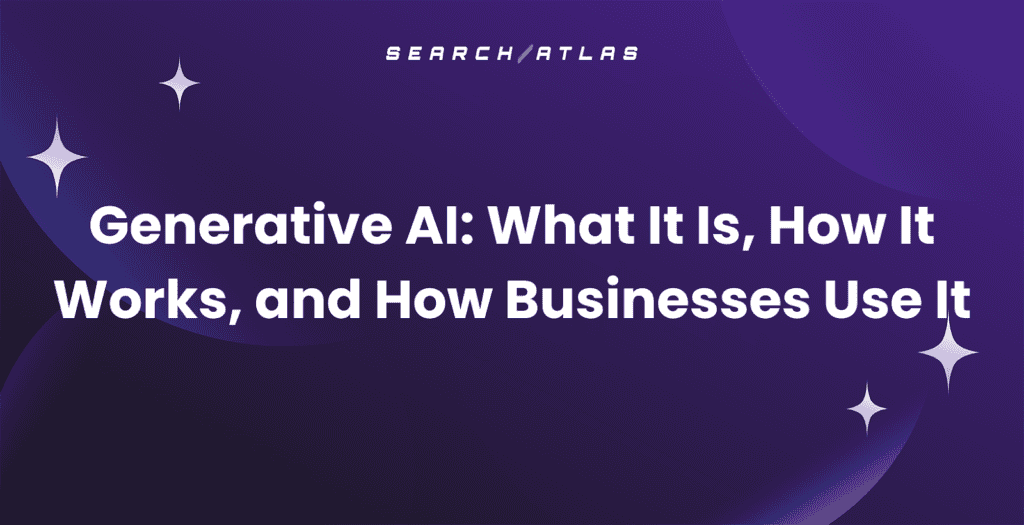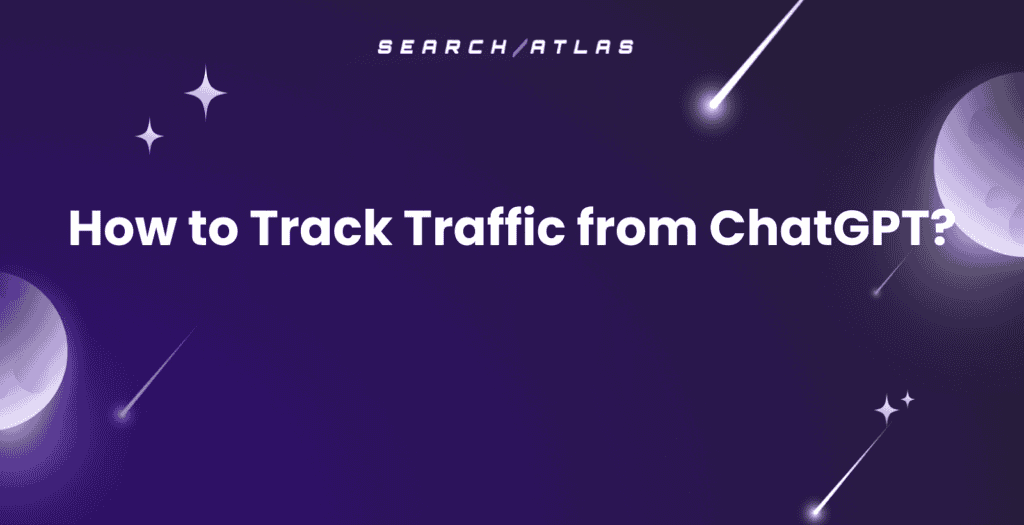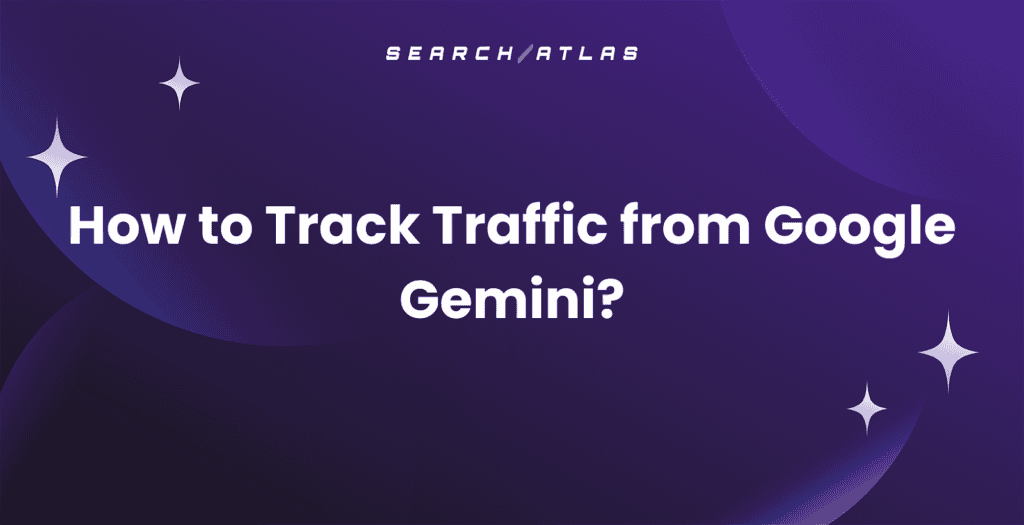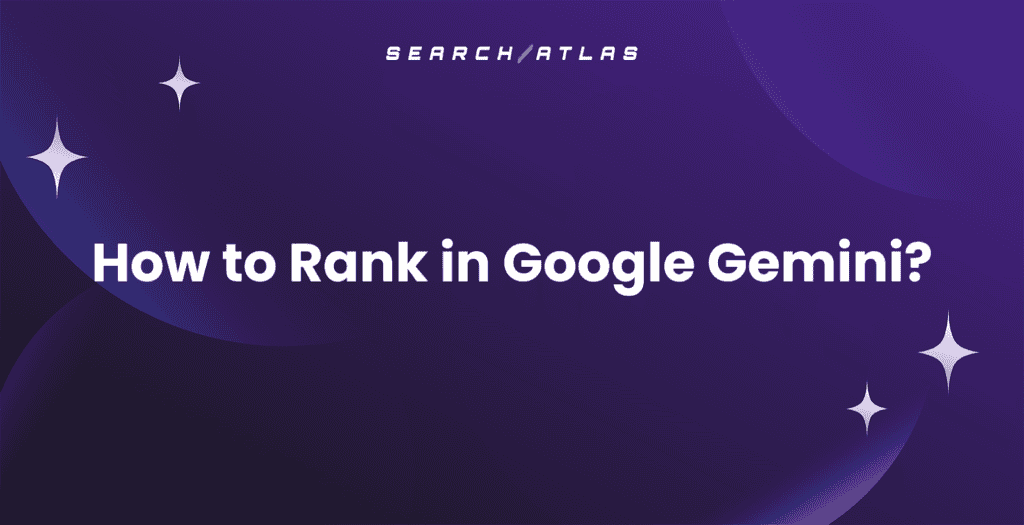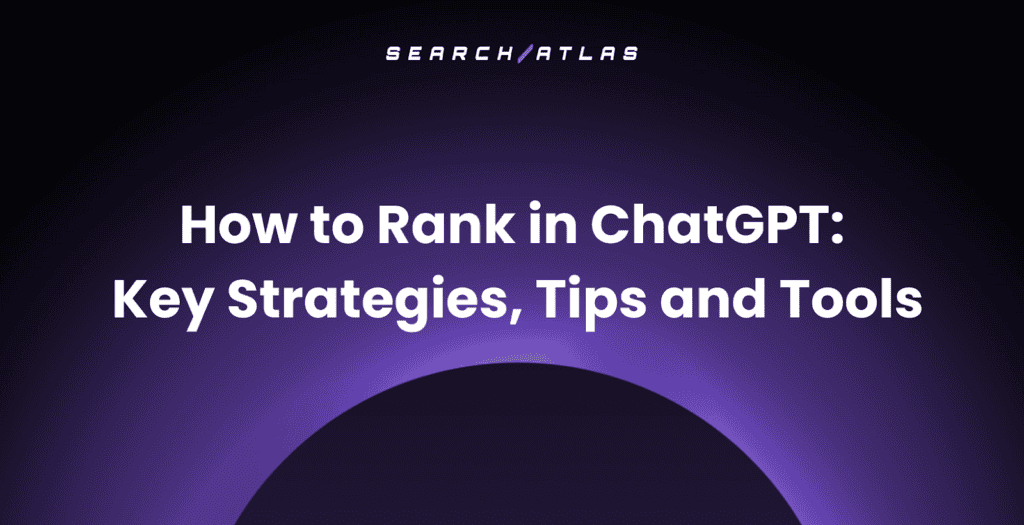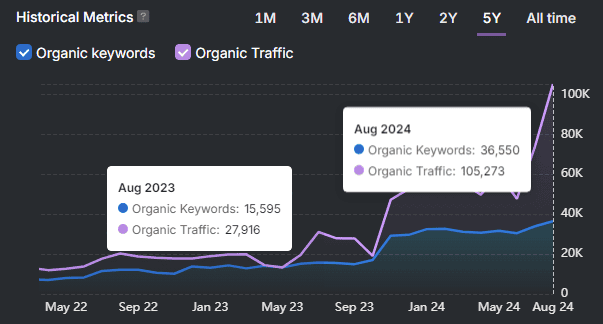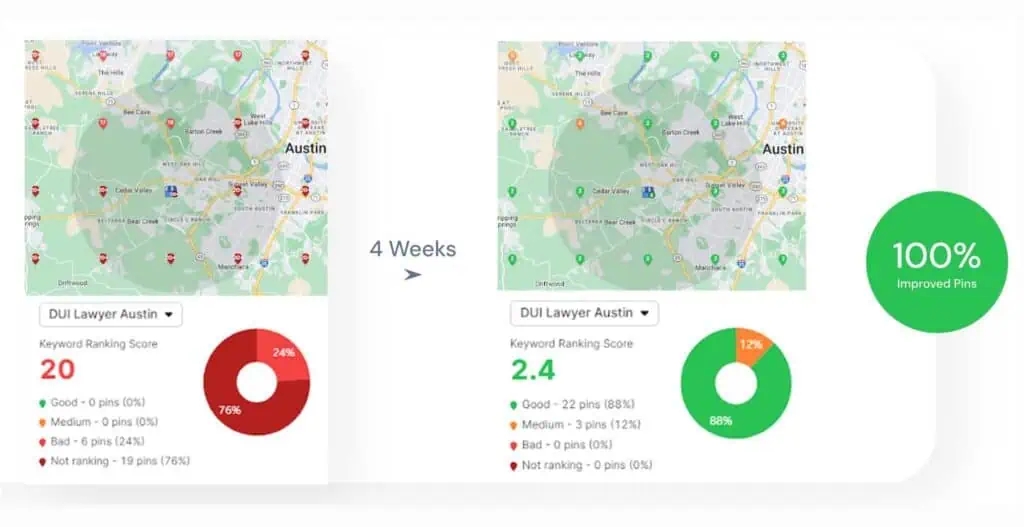To achieve SEO agency profitability through AI, automate time-consuming tasks such as technical fixes, keyword research, content optimization, and competitor analysis. Automation leaves you more time to focus on strategy, which improves client outcomes and increases overall productivity.
We explain SEO automation, its benefits to agencies, and the strategies marketers use to improve profitability and efficiency with AI.
What Is AI Automation?
AI automation combines artificial intelligence with automated processes to perform tasks independently. It learns from data using machine learning, natural language processing (NLP), and computer vision. The goal of this technology is to make autonomous decisions, adapt to new situations, and continuously improve its performance.
An AI SEO Agency is a business framework where you partner with a primary SaaS focused on SEO automation to incorporate AI into your procedures.
Common AI SEO tools are listed below.
- Automated content generation tools
- Keyword research tools
- Technical optimization tools
- On-page optimization tools
- Link building tools
- Digital public relations tools

How AI Automation Benefits SEO Agencies
There are numerous compelling benefits driving AI automation adoption in SEO agencies. According to the Hubspot Marketing Strategy Report, 43% of marketers use AI for content creation, while 34% use it for research.
These advantages are reshaping how successful agencies operate and you can’t afford to stay behind. We explain more benefits of AI for SEO below.
- Accelerated Content Creation. AI tools streamline content generation, enabling marketers to produce high-quality material more efficiently.
- Enhanced Time Efficiency. By automating repetitive tasks, AI allows marketers to focus on strategic initiatives. 86% of marketers report saving several hours daily through AI-assisted creative processes.
- Improved ROI. According to another Hubspot report, 68% of marketing leaders saw positive ROI with their investment in AI.
- Increased Productivity. AI tools contribute to higher employee productivity.
- Scalable SEO Strategies. AI facilitates the scaling of SEO efforts by automating keyword research, content optimization, and performance analysis.
- Data-Driven Decision Making. AI analyzes vast amounts of data to provide actionable insights, which helps marketers make informed decisions.
- Enhanced User Experience. Businesses offer a more tailored and engaging user experience by personalizing content and optimizing navigation through AI. This leads to higher retention rates.
- Cost Reduction. Automating SEO processes with AI reduces the need for extensive manual labor, which leads to significant cost savings in the long term.
- Competitive Advantage. Early adoption of AI in SEO provides businesses with a competitive edge, as they adapt more quickly to changes in search engine algorithms and consumer behavior.
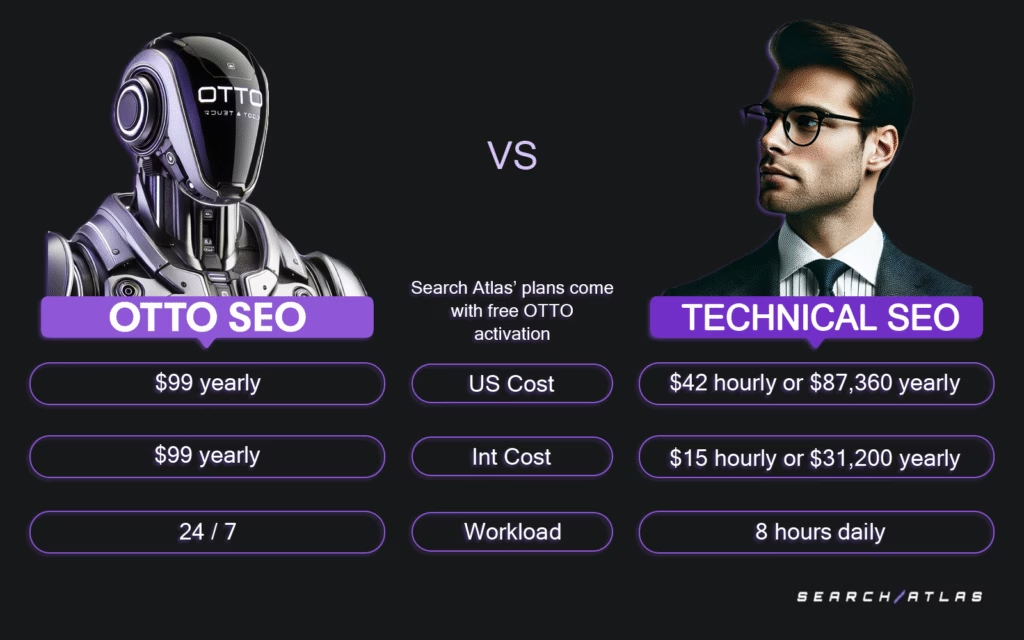
What Factors Influence Your AI SEO Agency’s Profitability?
Factors that influence your AI SEO agency’s profitability are explained in detail below.
Initial Investment Capabilities
The initial investments generally fall within the range of a few thousand dollars to tens of thousands of dollars. Common initial investments are listed below.
- AI Software Subscriptions. There are cost-effective tools available.
- Website Development. Building a professional website to showcase your services and attract clients. It’s possible to do it quickly and with AI.
- Marketing and Branding. Creating marketing materials, developing a brand identity, and initial advertising to reach potential clients.
- Staffing. Hiring SEO specialists with expertise in AI applications.
Despite the initial costs, the growing demand for AI SEO services can yield significant returns.
Market Positioning
An SEO agency’s profitability is heavily influenced by its market positioning and brand identity. Agencies that position themselves as specialists in particular industries or SEO techniques often charge premium rates and attract a more targeted clientele. To position itself in the market, an agency needs to build a portfolio of successful campaigns and client testimonials.
Specialization and Focus
Narrowing your focus to specific areas of SEO often provides numerous advantages. These advantages are listed below.
- Premium pricing for specialized expertise
- Lower client churn due to tailored results
- Reduced acquisition costs
- Stronger referrals
- Smarter use of AI tools due to consistent training
Lead Generation
Maintaining a steady flow of qualified leads is crucial for an SEO agency’s growth and sustainability. Aggressive and diverse marketing efforts are necessary to attract potential clients. Agencies are able to become more selective as they mature and build their reputation.
Client Retention Strategies
Long-term profitability in the SEO industry hinges on building and maintaining strong client relationships. Strong client relationships thrive with exceptional service, transparent communication, and consistent results.
Offering additional value through ongoing support, regular updates, and proactive strategy adjustments helps retain clients and generates recurring revenue streams. AI-powered report generation significantly enhances client retention by providing detailed, data-driven insights into the results.
The 9 Best AI-Driven SEO Strategies to Increase Profitability
To increase profitability, follow the best AI SEO strategies. The 9 best AI-driven SEO strategies are listed below.
1. Streamline Creating Content
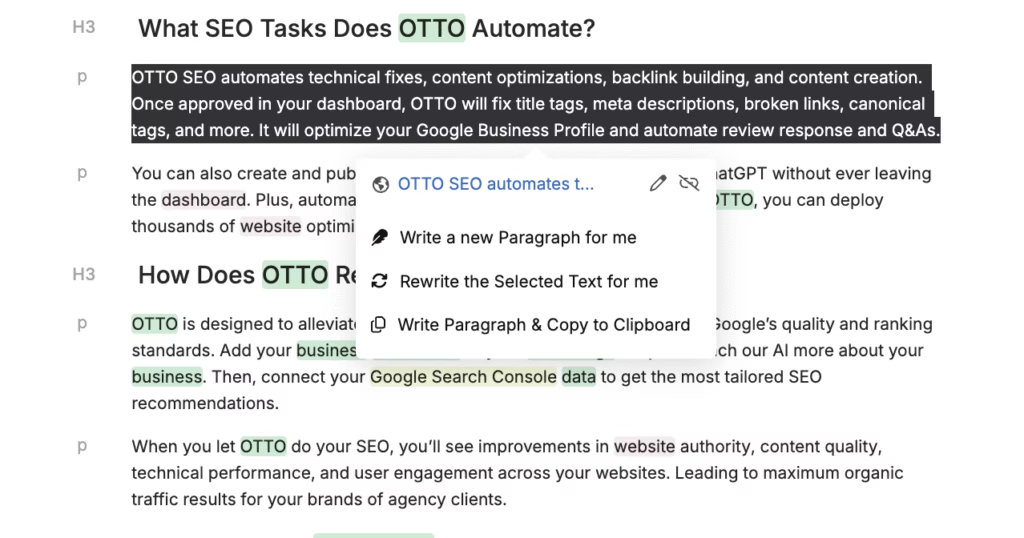
Content creation is the most common use of AI tools. AI tools are used to generate content plans, content briefs, headlines, first or complete drafts, or even complete SEO-friendly blogs. AI content tools like Search Atlas Content Genius streamline the entire process of content creation. The capabilities of Content Genius are listed below.
- Content writing
- Content optimization
- Content rephrasing
- Bulk AI content writing
- Competitor content analysis
- Automatic keyword optimization and research
2. Analyze Data Across Multiple Sites
AI-integrated analytics tools quickly identify patterns and trends in your SEO performance. Analytics tools present data in visual formats for easier interpretation. This is critical when you need to reference multiple sites for various clients.
3. Research Competitor Keywords
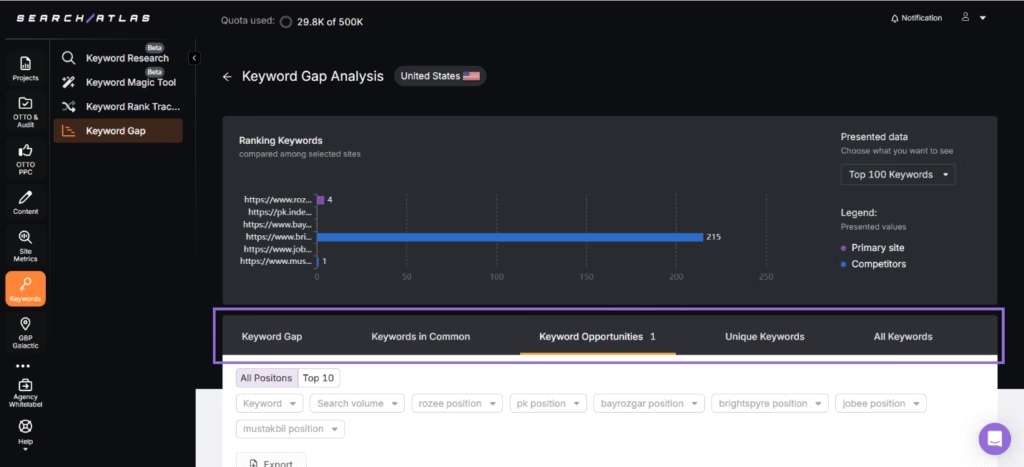
Researching competitors is challenging due to vast data, frequent changes, and difficulty identifying high-value opportunities. Competitor keyword analysis tools simplify this by analyzing large datasets, tracking trends, and uncovering actionable insights like keyword performance, search intent, and traffic potential.
The Search Atlas Keyword Gap Tool reveals keywords your competitors rank for but you don’t. Use it to spot ranking gaps, missed topics, and high-potential opportunities. To perform keyword fap analysis, first, find competitors that outrank you. Second, pinpoint terms they target but underperform on. Third, create stronger content to win those spots.
4. Research Competitor Content and Topical Dominance
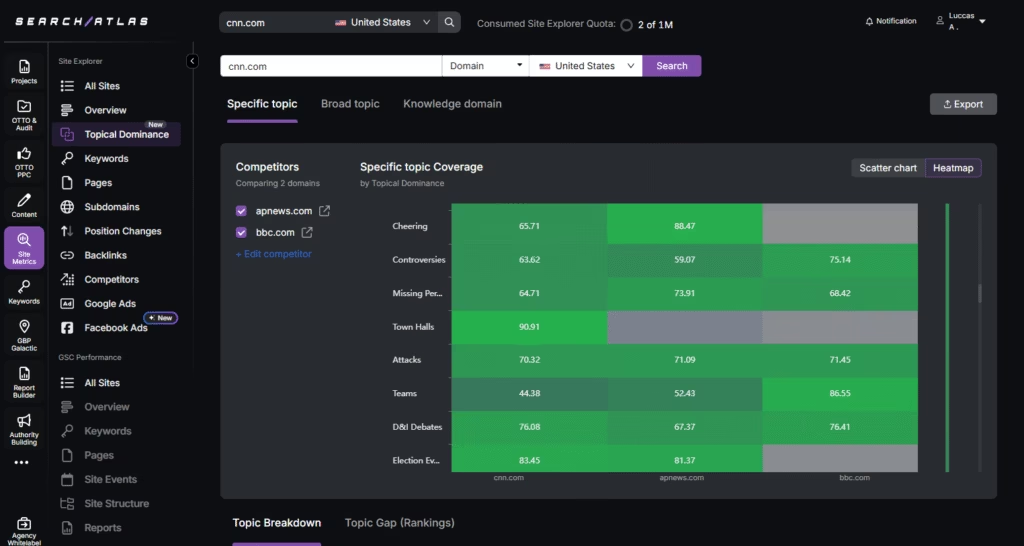
To research competitor content effectively, start with Site Explorer and the Topical Dominance Tool. Enter competitor domains into Site Explorer and examine their performance across three levels (specific topic, broad topic, knowledge domain). Then, analyze the Topic Gap section. This reveals which topics your competitors cover that your site has not addressed or ranked for. Use scatter plots or heatmaps to visualize topical authority and compare strengths.
Export the full report with a single click to streamline your workflow. Build dominance by increasing content velocity, expanding topic depth, and narrowing your topical focus. Track performance regularly. Use AI-powered competitor analysis to gather insights faster, identify gaps, and prioritize content that elevates your authority on high-value topics.
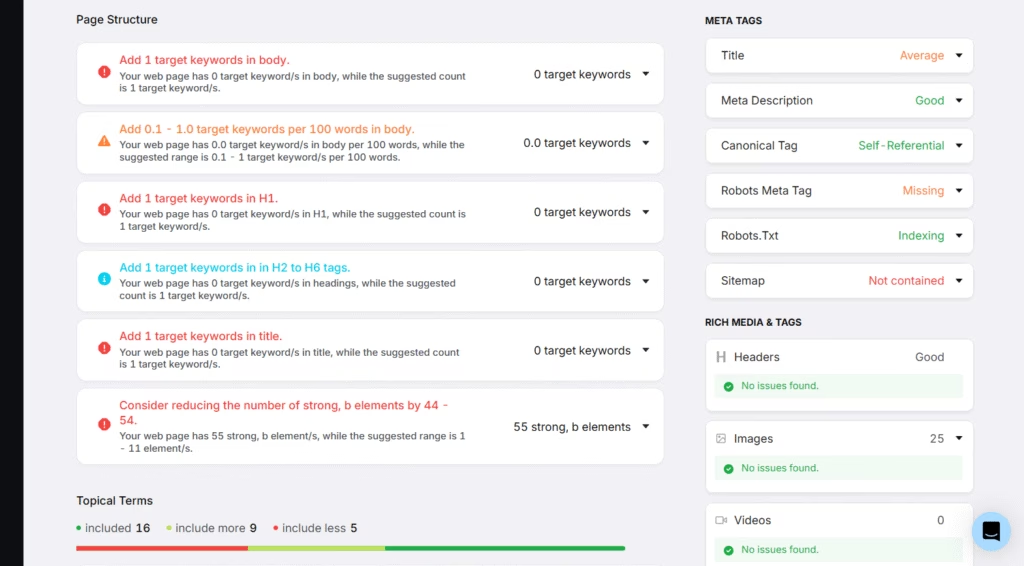
Next, use the Onpage Audit Tool to evaluate how your content compares to the top performers. This tool uses AI to audit each page against SEO best practices and competitor benchmarks. It identifies where your content falls short and provides clear suggestions for improvement.
The Onpage Audit Tool analyzes each page for a number of metrics. The types of metrics are listed below.
- Content Score. Benchmark against top competitors.
- Word Count. Align with top-performing content
- Readability. Raise clarity and flow based on scoring models.
- Page Structure. Optimize keyword use in body, title, headings, and tags.
- Meta Tags. Fix gaps in title, description, canonical, and robots tags.
- Rich Media. Check image optimization, schema markup, video use, and link structure.
5. Generate Schema Markup
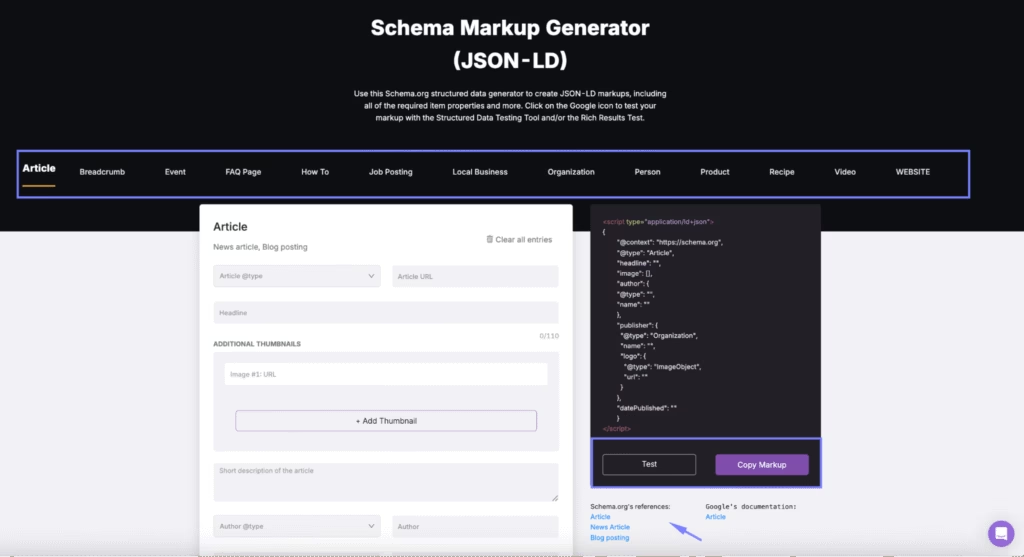
Creating and implementing schema markup code is not always for the faint of heart. This usually requires an SEO expert to find the recommended schema types and have a developer implement the code on a website.
AI SEO tools provide recommended schema markup, write the code, and even implement the code to your website in a few clicks.
6. Deploy Technical SEO Fixes Automatically
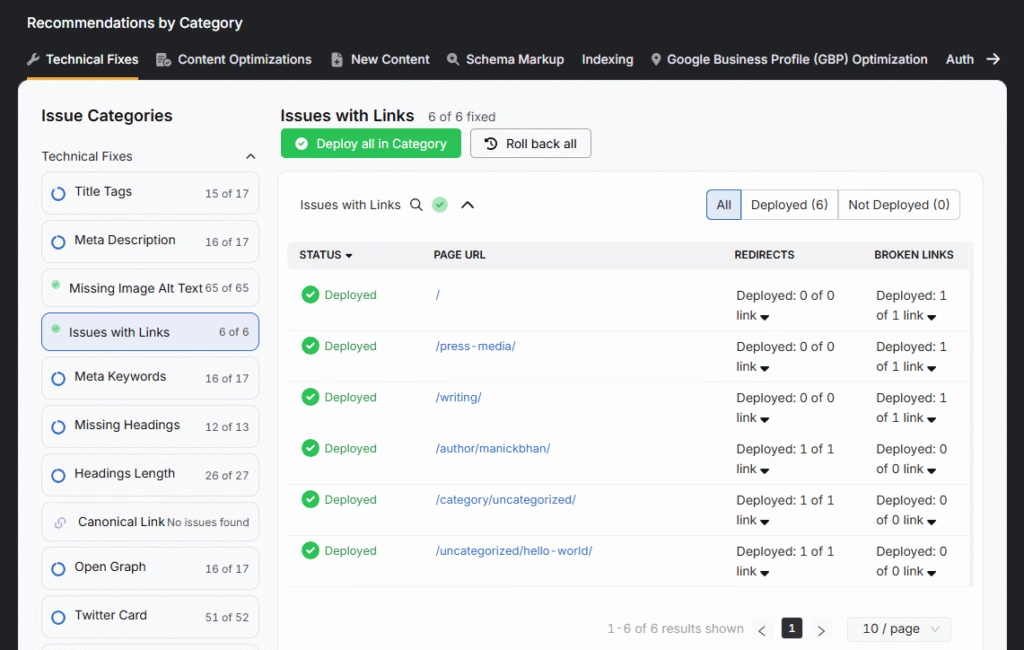
Technical SEO fixes cost agencies more because of complex audits, specialized expertise, and time-intensive tasks. Issues like site speed, mobile usability, and crawl errors require coordination between SEO specialists and developers, which increases expenses.
Ongoing updates to match search engine algorithm changes raise the cost of maintaining technical optimization. These demands turn technical SEO into a major investment for agencies that focus on quality.
AI tools reduce this burden. They detect issues like broken links, slow load times, and mobile usability problems. They also suggest immediate fixes. This automation cuts down time and keeps your site aligned with SEO standards.
7. Build Authority Through AI-Driven Link-Building
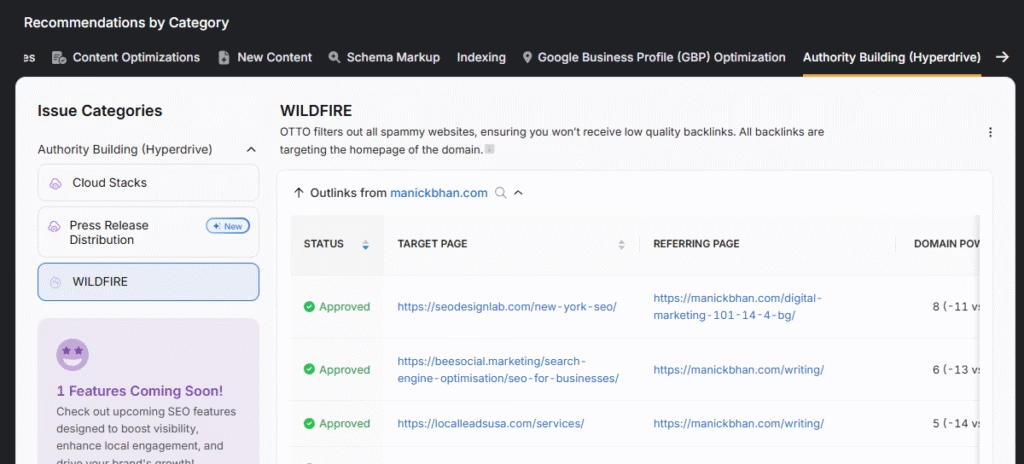
AI assists in identifying high-quality link-building opportunities, analyzing competitor backlink profiles, and suggesting content ideas that attract authoritative backlinks.
It optimizes press release syndication, streamlines cloud stacking processes, and automates link building campaigns. These AI-driven strategies increase domain authority and improve search engine rankings.
8. Automate Manual Work
To automate manual work at scale, use an AI agent like OTTO SEO. AI Agents support agencies by reducing manual workload, improving efficiency, and increasing output quality. The benefits of AI agents for agencies are listed below.
- Scaling content production without hiring more writers
- Identifying and fixing technical SEO issues faster than manual audits
- Automating repetitive tasks like meta tag updates and link outreach
- Maintaining consistent SEO performance across multiple clients
- Freeing up team time for strategic planning and creative work
- Delivering faster results, which improves client retention and satisfaction
- Lowering operational costs while expanding service capacity
9. Adapt to Algorithm Changes On the Go
Core algorithm updates often create one of the most expensive and time-consuming challenges for SEO agencies. Major changes demand full team attention and reduce production hours while clients expect immediate solutions.
OTTO SEO tracks algorithm updates and SEO trends in real time. It adjusts strategies, updates content, and corrects technical elements. This automation keeps websites optimized, maintains visibility, and supports long-term performance.
Challenges of AI Automation and How to Overcome Them
We explore common challenges of AI automation and ways to overcome them.
Dynamic Competitive Environment
The AI-driven SEO market features intense competition, with many agencies and businesses striving for leadership. To differentiate, firms focus on niche markets or unique AI solutions. Adopting SaaS platforms that regularly release new features helps maintain a competitive edge.
Search Engine Algorithm Fluctuations
Search engine algorithms change constantly, which makes it difficult to keep rankings stable. Staying alert and adaptable helps businesses navigate these shifts and maintain search visibility. Dynamic SEO uses automation to monitor search engine changes continuously. Search Atlas employs this dynamic SEO with its AI Agent, OTTO. OTTO applies optimizations automatically as needed, which reduces the need for manual research and testing.
Managing AI-Generated Content
AI improves content creation but introduces risks. Some AI-generated content violates Google’s spam policies, leading to penalties or loss of organic traffic. Ensuring content aligns with Google’s E-E-A-T (Experience, Expertise, Authoritativeness, Trustworthiness) guidelines requires oversight from skilled creators and a clear content strategy. AI content checkers support maintaining content quality and compliance.
To avoid this problem, Search Atlas’ content writing assistant analyzes your website, GSC, GBP, knowledge graph, and SERP results to generate the best possible content for you.
In this Search Atlas case study, the client needed content in a really sensitive topic that falls under YMYL (Your Money Your Life) content: longevity and anti-aging science. This advanced AI writing approach made the science website increase its monthly organic traffic by +1,149%!
How to Get Started With AI-Driven SEO and Maximize Profitability
There are 4 steps to getting started with AI-driven SEO. The 4 steps are explained in more detail below.
Step 1: Choose the Most Cost-Effective Software
Many software solutions trap agencies with expensive per-client pricing that erodes profits when you scale. Smart agencies select tools with tiered pricing or agency-specific plans that accommodate multiple clients under one subscription. All-in-one marketing platforms deliver superior value because they eliminate the need for multiple specialized tools. This keeps total software expenses manageable when your client base grows.
Step 2: Leverage White-Label Services
White-label platforms allow complete customization of dashboards, URLs, and reports with your agency branding. Clients receive professional materials that appear to come directly from your agency when you implement proper white-labeling. White-label SEO reporting tools create branded experiences without requiring expensive in-house development.
Step 3: Implement an AI Agent for Clients
AI agents install directly on client websites where they perform optimization tasks automatically. These systems monitor performance, identify opportunities, and implement improvements without manual intervention. Your team gains time for strategic work when routine SEO tasks run automatically, allowing you to serve more clients effectively.
Step 4: Focus on Personalization
AI systems generate insights about client websites and audience behavior that inform personalized strategies. Your team uses this data to craft communications and approaches that address each client’s specific needs. Personalized service based on AI insights strengthens client relationships and delivers better results.
What Is the Best Tool for SEO Agency Profitability?
Search Atlas is specifically designed to make AI SEO agencies scalable and profitable. We explore its AI tools below.
AI SEO Tools That Work as an All-in-one Solution
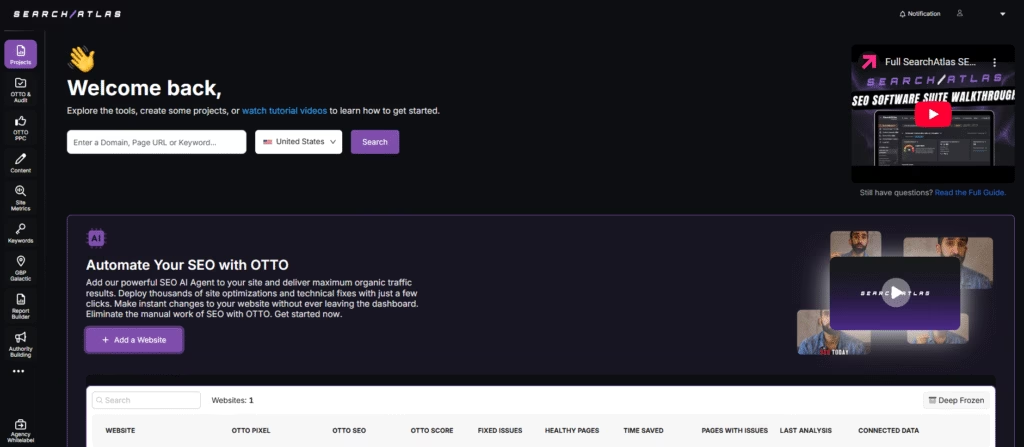
Search Atlas conducts comprehensive SEO audits, generates quality content, resolves technical issues, and automates competitor research.
The platform integrates essential SEO tools and AI capabilities into one subscription, which eliminates operational costs from multiple tool subscriptions. Search Atlas connects seamlessly with Google Search Console (GSC), Google Business Profile (GBP), and Google Analytics (GA4) to centralize crucial data and functions within a single interface.
Search Atlas extends beyond traditional SEO tools by providing direct access to press release distribution, journalist outreach, and AI-powered HARO responses. The platform includes access to the largest global link exchange network, which enhances your agency’s PR capabilities and link building efforts without requiring separate services.
OTTO SEO: An End-to-End AI SEO Solution for Growing Agencies
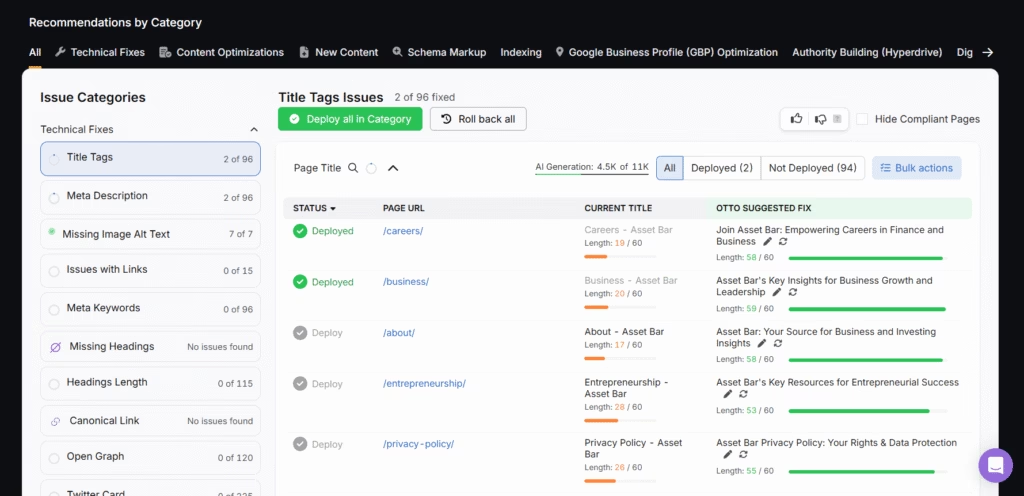
At the heart of Search Atlas is OTTO SEO, an AI-driven autopilot that autonomously executes a range of SEO tasks.
OTTO SEO grows with your client, adapting its algorithm to their SEO strategy and Google changes, which makes it particularly cost-effective for expanding agencies.
OTTO eliminates the need to create new strategies after every Google update by adapting automatically on each website. Unlike tools that only suggest changes, OTTO implements technical SEO fixes, content updates, and on-page improvements. Some users may find the tool complex, but dedicated support and personalized onboarding ease this issue.
It All Comes Down to Scalability
The success and profitability of SEO agencies depend on tools that efficiently scale with growing client portfolios without proportional cost increases. Search Atlas delivers this balance through AI automation that minimizes manual work and competitive pricing structures that protect profit margins when your agency expands, ensuring sustainable growth rather than diminishing returns.
Ready to scale your agency? Discover our agency-focused features and pricing!


